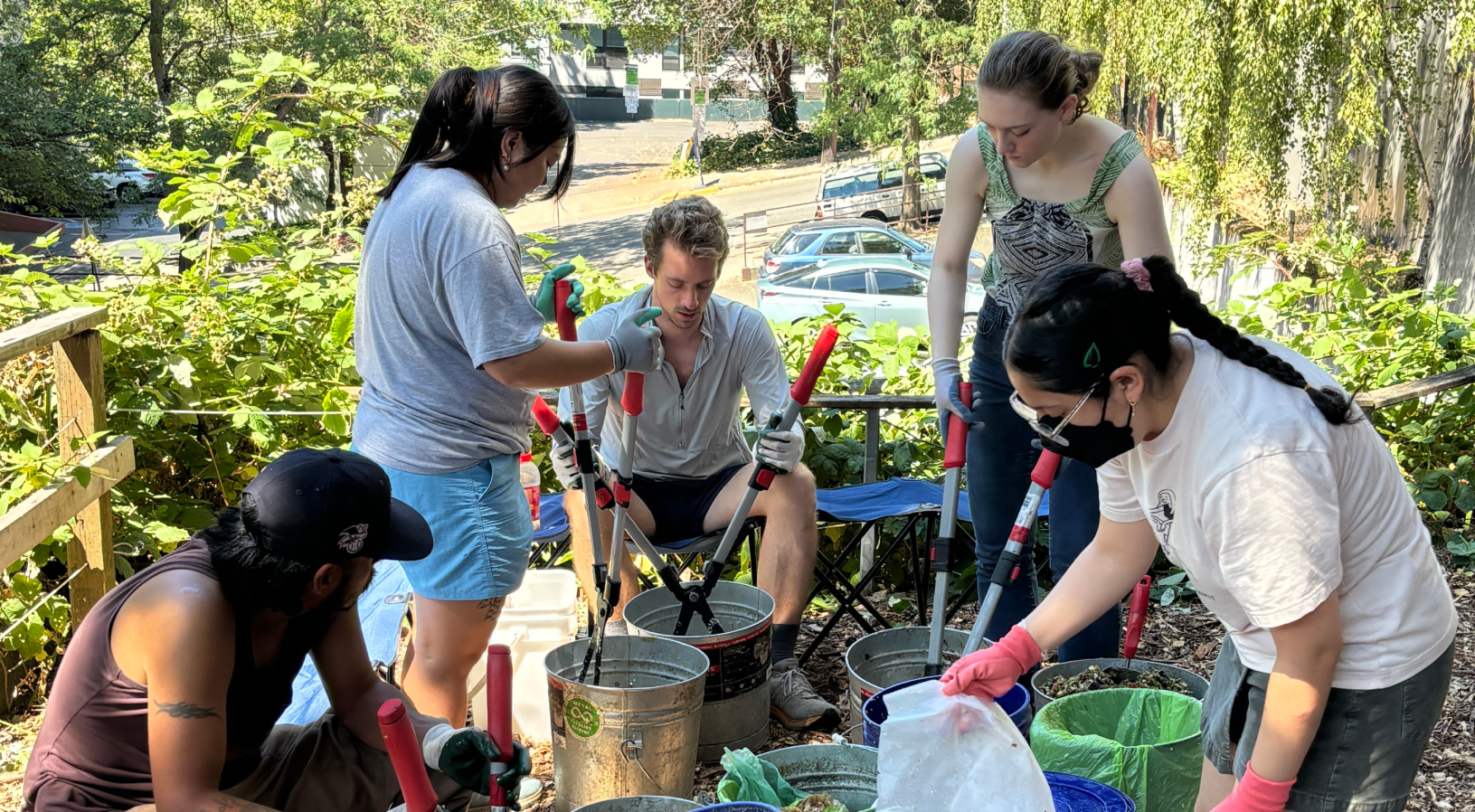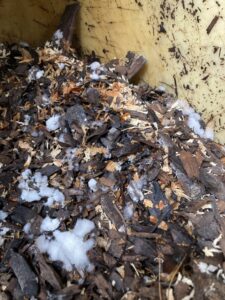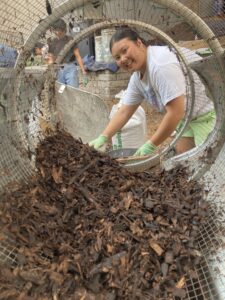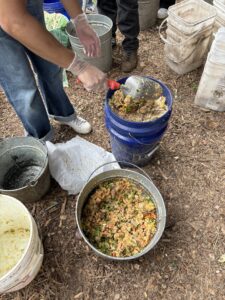News
Restaurant 2 Garden: Q&A with The Russell Family Foundation

Restaurant 2 Garden (R2G) is a community-led project that launched in November 2021 to provide free compost to the gardeners of the Chinatown International District (CID) neighborhood in Seattle. Restaurant 2 Garden aims to create a decentralized and hyper-local community composting system, eliminating the need to transport food waste and compost in and out of the neighborhood.
How does your organization plan to engage and collaborate with new partner food businesses in CID for food scraps collection and processing? What strategies do you use to ensure the convenience and reliability of this collection process, especially when dealing with multiple food businesses?
We are in the early stages of recruiting new partner food businesses, as the site development is still underway. Businesses that are already interested in our expansion include Dong Sing Market, Chu Minh Tofu, Phin Coffee, Eastern Cafe & Oasis, World Pizza, Purple Dot, A+ Hong Kong Kitchen, and Gan Bei Eatery. Each business has unique operational factors such as hours, amount of food scraps, and available space, which our food waste collection services aim to accommodate to the best of our ability.
 For our current partners, like ltsumono, and Panama Hotel and Tea House, we use their existing compost bins, match their current sorting procedures, and even clean bins as necessary. As we incorporate the new food businesses into the food pick up route and schedule, we will use a CRM system to manage new partnerships and streamline logistics.
For our current partners, like ltsumono, and Panama Hotel and Tea House, we use their existing compost bins, match their current sorting procedures, and even clean bins as necessary. As we incorporate the new food businesses into the food pick up route and schedule, we will use a CRM system to manage new partnerships and streamline logistics.
Weekly workdays take place consistently—rain or shine. We ensure our presence at the site, even during holiday weekends (except on holidays themselves). This consistent visibility helps foster trust and word-of-mouth referrals, strengthened by targeted outreach.
To further expand our network, we have preliminarily identified additional potential businesses through a recent market study. To expand on this initial effort, we also plan to collaborate with graduating B.A. and M.A students for their capstone program to conduct user research and program evaluations, mutually benefitting their academic goals and R2G’s operational development.
Can you elaborate on the public education and outreach at the 919 S. King St. site, particularly in terms of volunteer workdays, tours, and workshops? How do you tailor these activities to engage community members who are BIPOC, low-income, and non-English speaking individuals?
At the 919 S. King St. site, we are dedicated to creating accessible, educational experiences tailored to the diverse needs of the CID community. Through thoughtfully designed volunteer workdays, tours, and workshops, we aim to foster a sense of ownership and community while making education about composting and waste diversion both practical and culturally relevant.
Here’s how each component contributes to this vision:
Volunteer Workdays:
Weekly volunteer workdays are held on Saturday mornings from 10:30 a.m. to 1:30 p.m, featuring reoccurring tasks including collecting food waste from CID businesses, creating bokashi buckets, and maintaining the hot compost (Earth Cube). Maintaining the hot compost may include turning the pile to aerate the compost, adding feedstock, and monitoring activity by temperature. Other tasks sometimes include compost harvest and site maintenance. These workdays are lively and inclusive events, with volunteers welcoming new folks and finding community with each other. With low barriers to entry, we don’t require an extensive registration process, provide all PPE and materials, and ensure tasks are easy to learn, making participation accessible for all ages.
 In-Person Tours
In-Person Tours
Tours offer an immersive audio-visual guide that highlights not only the composting process but also showcases a re-localized waste management solution in which a community’s resources are retained and reinvested into that region. There are also informal tours which include identifying the site’s infrastructure and materials, narrating decomposition at the micro level, and telling the story of R2G’s mission and vision.
Workshops
Workshops offer a hands-on opportunity to engage with each stage of the composting process. For example, a recent session with Lakeside Middle School students provided age-appropriate facilitation and tasks including aerating the compost and creating bokashi buckets. While workshop tasks currently fluctuate due to the status of the compost cycle, as our capacity grows, we hope to offer comprehensive workshops that cover the full composting process in a single session.
Target audience engagement
To support the programming mentioned above, outreach materials are in the development process including a presenter’s guide and takeaway materials translated into multiple languages prevalent in CID and greater Seattle area, including Cantonese, Mandarin, and Vietnamese. Beyond language, the materials will emphasize practical, cost-effective waste diversion strategies, and culturally relevant foods, presented in an accessible and informal format. We also prioritize direct communication with multilingual staff to connect with community members, rather than through an interpreter.
Who are your core partners in this food and farm ecosystem? And do you have ideas about how to connect and expand the local and regional ecosystem?
Our core operational partners are CID food businesses, DWCG gardeners, and our site property owners (Chinese Baptist Church and WSDOT). As we look ahead, we plan to expand and not only scale up but also replicate our community-based composting model.
 As part of a larger movement, we are excited about Washington state’s recently passed HB 1799, which targets a 75% reduction in landfill-disposed organic materials by 2030 by requiring the redirecting organic waste from landfills to food recovery initiatives and composting systems. This aligns with our vision for improved food waste management and encourages greater support across the state towards this goal. As a growing leader in community-based, hyperlocal composting solutions, we anticipate growing interest in replicating our model, and increased opportunities to collaborate, leading to the development of an interconnected local and regional ecosystem. To prepare, we aim to strengthen our internal capacity and demonstrate the ability to scale through this grant opportunity.
As part of a larger movement, we are excited about Washington state’s recently passed HB 1799, which targets a 75% reduction in landfill-disposed organic materials by 2030 by requiring the redirecting organic waste from landfills to food recovery initiatives and composting systems. This aligns with our vision for improved food waste management and encourages greater support across the state towards this goal. As a growing leader in community-based, hyperlocal composting solutions, we anticipate growing interest in replicating our model, and increased opportunities to collaborate, leading to the development of an interconnected local and regional ecosystem. To prepare, we aim to strengthen our internal capacity and demonstrate the ability to scale through this grant opportunity.
What are your top priorities this year/the next few years?
Our top priority this coming year is to add an additional composting site in the CID neighborhood to increase local food scrap processing. Additionally, we’re focused on working with food businesses in the CID one-on-one to streamline scrap collection and processing.
What has been your greatest obstacle in championing your mission?
Our mission and project have been quite successful in garnering support from public funders in the past four years because community composting is often listed as one of the strategies in local government climate action plans. While public funding has played a key role, securing unrestricted funding sources to build the organization’s capacity is a pressing challenge.
What programmatic areas are you looking to grow with continued support/funding?
We plan to expand education and outreach beyond the Seattle/CID area and engage in advocacy focused on community composting efforts and organics management.